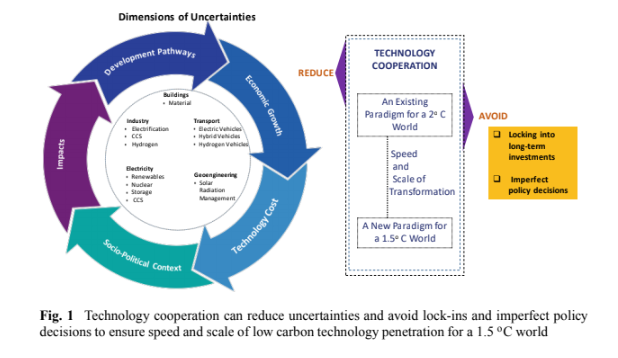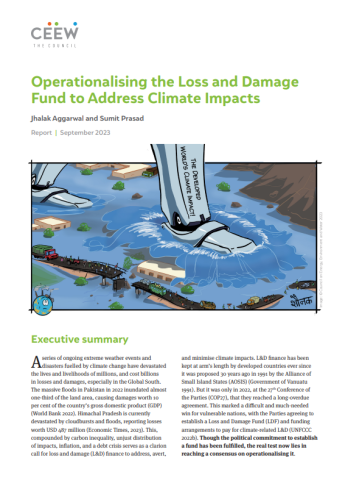Book Chapter
Climate Ambition Needs Targeted Technology Collaboration
Arunabha Ghosh, Vaibhav Chaturvedi, Shikha Bhasin
May 2019 | International Cooperation, Technology Futures
Suggested citation: citation: Ghosh, Arunabha, Vaibhav Chaturvedi, and Shikha Bhasin. 2019.“Climate Ambition Needs Targeted Technologies Collaboration”. In 20 Years of G20: From Global Cooperation to Building Consensus, edited by R Kathuria and P Kukreja, 157-179. Singapore: Springer
Overview
This chapter highlights the type of technologies that will be crucial for meeting global climate goals and specifies the uncertainties associated with them. It focuses on ambiguities pertaining to development pathways, economic growth, technological development and cost, socio-political factors, and secondary and tertiary impacts. It also outlines the principals for more effective technology partnerships to meet climate stabilisation targets. Further, it provides the templates of three alternative modalities for technological development.
Key highlights
- Depending on which development path the world takes, the dynamics of technology cooperation would be very different.
- Economic growth is important for the purchasing power of mitigation technologies. It impacts technology innovation and the scale at which a mitigation technology penetrates in countries across the world.
- How societies respond to various trade-offs associated with a given technology in the medium and long run will have a bearing on the evolution of mitigation technologies.
- A better characterisation of uncertainties and attempting to reduce these through technology cooperation could help in informing government policy and avoiding lock-ins.
- The transport sector is considering electric vehicles (EVs), hybrid vehicles (HBVs) and hydrogen vehicles as alternative low-carbon vehicles. With the fast decline in battery costs, the cost of EVs has fallen more rapidly. Progress in the other two technologies is more uncertain.
- The industrial sector can turn to electrification, carbon capture and storage (CCS) or hydrogen-based applications as low-carbon options. The uncertainties related to CCS are far higher than those related to electrification of industrial energy use.
- Due to uncertainties in future storage technologies, large-scale investments in specific types of battery manufacturing plants may become risky.
- The biggest uncertainties in the building sector are institutional and regulatory, given that regulating the real estate sector has been a challenge in many countries, especially developing economies.
- There are a number of uncertainties surrounding the technical feasibility, economic viability and political motivation behind various solar radiation management (SRM) technologies.
- A better characterisation of uncertainties and attempting to reduce these through technology cooperation could help in informing government policies and avoiding lock-ins.
Technology cooperation can reduce uncertainties and avoid lock-ins and imperfect policy decisions to ensure speed and scale of low carbon technology penetration for 1.5-degree Celsius world

Key recommendations
- Collaborators should ensure clarity of objectives to reduce uncertainties related to development pathways or socio-political impacts.
- Ensure a degree of price certainty in technology cooperation to avoid frequent renegotiation of terms.
- Ensure clarity on risks and responsibilities in multi-country partnerships.
- Determine in advance rules governing voting rights, decision-making procedures, transparency and prior information for affected parties/communities. Revise or updated the same as the technology evolves or more countries get involved in field pilots and commercial testing.
- Consider alternative modalities such as enterprise-driven R&D for technology options, innovation fund for low-carbon technologies, and a G20 platform for horizon technologies to develop partnerships for low-carbon technologies.
Given the range of uncertainties that exist in deploying and diffusing low-carbon technologies, from costs to governance to impacts, technology partnerships will have to strategically surge ahead as platforms to tackle these uncertainties through targeted research, development and deployment.







